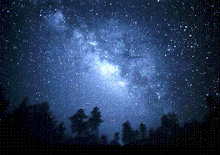Solar eclipse enthralls Asia
Solar eclipse spreads cloak of darkness over Asia
POST BY SMK KEAT HWA ASTRONOMY SOCIETY
POST BY SMK KEAT HWA ASTRONOMY SOCIETY
7/22/2009 3:05 AM GMT





The longest solar eclipse of the 21st century cast a shadow over much of Asia on Wednesday, plunging hundreds of millions into darkness across the giant land masses of India and China.
Ancient superstition and modern commerce came together in a once-in-a-lifetime opportunity which could end up being the most watched eclipse in history, due to its path over Earth's most densely inhabited areas.
While the well-heeled took to the skies to watch the phenomenon from specially chartered planes, others took to holy waters to purify themselves as the sun's rays were snuffed out from Mumbai to Shanghai.
The cone-shaped shadow, or umbra, created by the total eclipse first made landfall on the western Indian state of Gujarat shortly before 6:30 am (0100 GMT).
It then raced across India, blacking out the holy city of Varanasi on the banks of the Ganges, squeezing between the northern and southern tips of Bangladesh and Nepal before engulfing most of Bhutan, traversing the Chinese mainland and slipping back out to sea off Shanghai.
Monsoon clouds in India and bad weather over eastern China spoiled the party for millions who had got up early to watch the solar blackout.
In Mumbai, hundreds of people who trekked up to the Nehru planetarium clutching eclipse sunglasses found themselves reaching for umbrellas and rain jackets instead.
In Mumbai, hundreds of people who trekked up to the Nehru planetarium clutching eclipse sunglasses found themselves reaching for umbrellas and rain jackets instead.
Heavy overnight rain turned torrential just as the eclipse was due to start.
"We didn't want to watch it on television and we thought this would be the best place," said 19-year-old student Dwayne Fernandes.
"We didn't want to watch it on television and we thought this would be the best place," said 19-year-old student Dwayne Fernandes.
"We could've stayed in bed," he said.
"Maybe, we'll just tell people we did see it," suggested his classmate Lizanne De Silva.
"Maybe, we'll just tell people we did see it," suggested his classmate Lizanne De Silva.
A total solar eclipse usually occurs every 18 months or so, but Wednesday's spectacle was special for its maximum period of "totality" -- when the sun is wholly covered -- of six minutes and 39 seconds.
Such a lengthy duration will not be matched until the year 2132.
Superstition has always haunted the moment when Earth, moon and sun are perfectly aligned. The daytime extinction of the sun, the source of all life, is associated with war, famine, flood and the death or birth of rulers.
Desperate for an explanation, the ancient Chinese blamed a sun-eating dragon. In Hindu mythology, the two demons Rahu and Ketu are said to "swallow" the sun during eclipses, snuffing out its light and causing food to become inedible and water undrinkable.
In the run up to Wednesday's eclipse, some Indian astrologers had issued predictions laden with gloom and foreboding, while superstition dictated that pregnant women should stay indoors to prevent their babies developing birth defects.
A gynaecologist at a Delhi hospital said many expectant mothers scheduled for July 22 caesarian
deliveries insisted on changing the date.
For others it was an auspicious date, with more than one million Hindu pilgrims gathering at the holy site of Kurukshetra in northern India, where bathing in the waters during a solar eclipse is believed to further the attainment of spiritual freedom.
Those who could afford it grabbed seats on planes chartered by specialist travel agencies that promised extended views of the eclipse as they chased the shadow eastwards.
Travel firm Cox and Kings charged 79,000 rupees (1,600 dollars) for a "sun-side" seat on a Boeing 737-700 aircraft that took off before dawn from New Delhi for a three-hour flight.
In Shanghai, hotels along the city's famed waterfront Bund packed in the customers with eclipse breakfast specials.
In Shanghai, hotels along the city's famed waterfront Bund packed in the customers with eclipse breakfast specials.
"The clouds move in and out, then all of a sudden you see it," said Glenn Evans, 46, a US executive with a cosmetics company who lives in Shanghai and was viewing the eclipse from a rooftop bar along the Bund.
The last total solar eclipse was on August 1 last year and also crossed China.
The next will be on July 11, 2010, but will occur almost entirely over the South Pacific, where Easter Island -- home of the legendary moai giant statues -- will be one of the few landfalls.

No comments:
Post a Comment